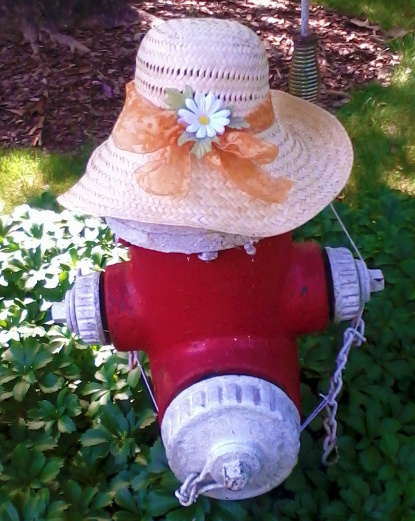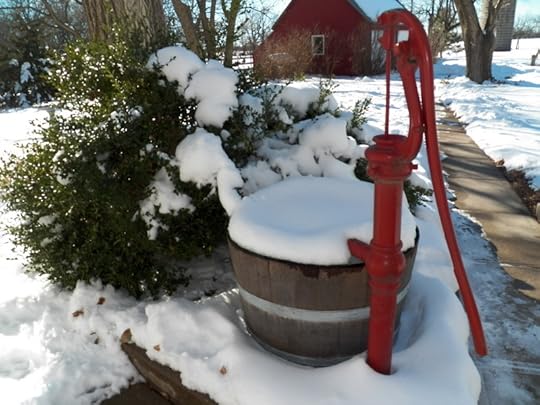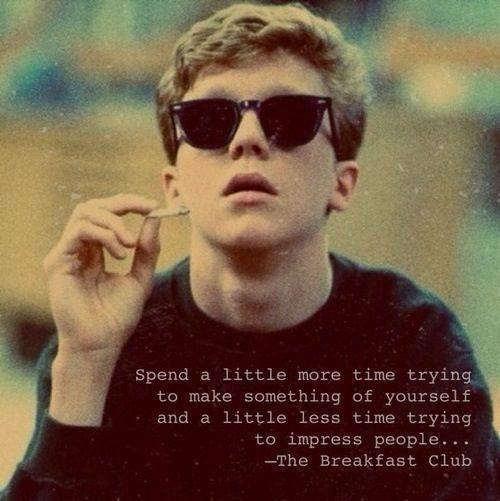Christy Potter's Blog, page 12
January 15, 2014
Foggy morning in a winter wood
Creation surrounds me,
even in the lull of winter.
Fog drapes a delicate hand between me
and nature’s sweet slumber,
whispering not to disturb her beauty rest.
Spring is coming.

January 13, 2014
Guest post: Is everybody in the whole wide world a Hemingway?
Today I’m hosting a guest blog post from fellow author Jon McDonald. I met Jon late last year through a blogger link-up site, and we hit it off immediately. His writing is witty and sharp – I’m currently reading his book “Divas Never Flinch” – and what he says here I could not agree with more. So with that, I’ll turn it over to Jon.
Has it finally come to this? Is everyone now a literary creative superstar? One would think so, looking at the world falling in love with their instantaneous tweets, texts, and emails. Remember when one would sit under a tree on a lazy summer afternoon engrossed in the intricacies of a complex, unfolding plot, with multiple, gripping, and engrossing characters. Remember falling in love with the wry stories of Jane Austen?
Alas, I guess I’m showing my age. Raised with books, and delightful jaunts to the library, I would sit on the floor perusing the lower shelves of the children’s section searching out my favorites – The Little Engine that Could, Fernand, the Bull, and one about a steam shovel that becomes a household furnace (can’t remember its name). There was time to read. No distractions. One could read and think, muse on the characters or story line, and live a life outside of one’s self.
I recently read a horrifying statistic. Eight-eight percent of American families own no books at all. I assume that means digital books as well. How about that? Eighty-eight percent! That’s whole families, not just individuals.
So we’ve become a society tweeting our every thought; stressing about our lives in texts, and so self-absorbed we delineate our lives in 140 characters.
No wonder no one is making a living as a writer anymore. I am a writer with 6 books of fiction. I started with a publisher – they did nothing with marketing and I switched to a second small publisher, hoping they might be more involved, and again – nothing. I am now in the process of taking back three of my books back from the second publisher and self-publishing them along with my other three already self-published books. At least now I have more control over the content and can market them myself. However, there is still the challenge of competing with 750,000 other books published every year.
However, I’ve come to the conclusion that in the world we live in now there may never be a market for thoughtful, reflective fiction like there used to be. Now everyone is their own Hemingway, lost in the amazement of their individual lives – the true fiction of the 21st Century. I have come to peace with the fact that I shall remain a gentleman writer, penning my delightful fantasies for myself, lost in the dusty corners of another century – or even two – long gone.
About the author:
Jon McDonald lives in Santa Fe, New Mexico. He currently has six published works of fiction:
• Divas Never Flinch – a satire about Santa Fe
• Bloodlines – the Quest – a humorous vampire thriller
• The Seed – An Ironic Political Thriller
• Ya Gotta Dance with the One who Brung Ya – sex, scandals and sweethearts – an eclectic collection of stories
• Divas in Cahoots – a reprise with the gals from Santa Fe as a murder mystery.
• The Hunt for the Lost Treasure of Lower Kal Ory – a children’s andventure and cookbook
He won first prize and was published in the Santa Fe New Mexican holiday short story contest, 2009. He has also been published in Raphael’s Village, ImageOutWrite, Bay Laurel, and Jonathan. For more on Jon, visit his website, www.jonmcdonaldauthor.com.
January 10, 2014
Return of the Friday Short Story: The Store
Over the next few weeks, I’m going to be implementing several changes to this blog, and among them is the return of the Friday Short Story. Longtime readers know I’ve done this periodically in the past, and with a little encouragement from them, I’ve decided to make it a regular feature again, starting this week. Today’s story is called “The Store.”
_________
“I don’t understand how this is not prostitution,” April said, handing Beth a mug and sitting down across from her.
“Prostitution implies sex,” Beth answered.
“But you said I can rent a man,” April said. “To do whatever I want him to do. That doesn’t include sex?”
“No. And besides, you’re missing the point.”
April stirred her coffee silently.
“Look, what did you say to me before? That started this whole conversation?”
“I said my bathroom sink is clogged.”
“And you said you wished you had a man to fix it.”
“That makes me sound helpless,” April protested. “I know how to unclog a sink.”
“You’re missing the point,” Beth repeated. “The point is that you wish you had a man around the house to help out with stuff when you need it.”
“It was a throwaway comment,” April said. “Because I hate unclogging sinks. And if I want to rent a man to do it for me, it’s called hiring a plumber.”
“You don’t understand,” Beth said.
“Clearly.”
“What do you miss, since Jason left?”
“Nothing. Gah.”
“I didn’t ask for your belligerent feminist answer. I want a real answer.”
April rubbed her eyes and sighed.
“I miss… hearing him moving around in the next room. I miss saying something stupid out loud and having him say ‘What?’ and me being embarrassed because I didn’t realize I’d said something stupid out loud. I miss being able to unload on him after a lousy day. I miss having him kill bugs and open jars. I miss smelling his cologne, I miss hearing his laugh.” She was near to tears now. “Satisfied?”
“Now what don’t you miss?”
“Come on, Beth, this is stupid.”
“You asked me to explain The Store so I’m trying.”
“I don’t miss fighting, the anger, the jealousy, the snoring, having to answer to someone else, his stubbornness, and those nasty bristly little black hairs he always left in the sink after he shaved. Which is probably why it’s clogged in the first place, incidentally.”
“And that’s where The Store comes in,” Beth said. “You meet the men, you pick one out, you pay for him and you bring him home. Then you tell him what to do, and he does it. No hassles.”
“It sounds creepy. They sound like robots.”
“They’re not robots. They’re men. They’re real actual flesh and blood men.”
“And you’ve done this?”
“Yes,” Beth said. “Several times. It’s probably the most amazing thing I’ve ever seen.”
“Why do they do this? The men, I mean.”
“I asked the same question,” Beth said. “The owner told me they sign up for it. They want to. It’s not indentured servitude. It’s not slavery. They chose to do this.”
“So it’s like an agency. Like a housekeeping agency.”
“Well, not exactly. More like a library. Rent one for as long as you want, return him when you’re done.”
“No rent to own option?”
“Now you’re getting into the fine print,” Beth said. “Let’s go see it and you’ll understand.”
“I still think it sounds creepy, but I am a little intrigued.”
Ten minutes later, they were in Beth’s car. April watched the cars passing them, the people walking along the sidewalk, couples holding hands, laughing friends, mothers pushing strollers. Everyone is going about their normal lives, and I’m sure if anyone looks at us, they’ll think the same thing, she thought. Except this isn’t normal. What we’re doing is not normal. This is some kind of effed up Orwellian fantasy gone wrong. And yet here I am, of my own volition.
Beth turned the car down an alleyway so narrow April half expected them to get stuck.
“Whoa, where are we? What is this? Is this even a street?”
“Yes, kind of. The Store is just a bit further down, at the end.”
Just before the alleyway opened back onto the regular street, Beth pulled the car into a little alcove where two other cars were parked. She shut off the motor and smiled at April.
“Ready?”
“No,” April said. “I’m a little freaked out here.”
“Don’t be,” Beth said, patting her hand reassuringly. “You don’t have to rent anyone or sign up for anything if you don’t want to. No pressure at all, from me or from them. I’m not getting anyone today – I still have one at home putting up a wallpaper border in my dining room. He’s smoking hot, too. I’m thinking of renewing him and taking him to my cousin’s wedding next weekend.”
The door was heavy, metal, and painted black, all signs that April was sure didn’t bode well for what they were about to encounter, but as they stepped inside, she caught her breath. It was beautiful – clean, spacious, well-lit, and decorated like a modernized Victorian mansion. A man wearing an Italian silk suit and tasseled loafers approached them.
“Ah, Ms. Anderson, how nice to see you again,” he said, taking Beth’s hand in both of his.
“Hello, Geoffrey. This is my friend, April Jensen. I was telling her about The Store and I thought she’d like to see it for herself.”
“Ms. Jensen, a pleasure to meet you. Please, come this way.”
He led them into a small room where everything was thicker and plusher than everything else. He sat down in an elegant, wingback chair and gestured for them to sit as well. Sinking back into some kind of chaise lounge that April was sure cost more than her car, she wondered again what she had gotten herself into.
“The Store, Ms. Jensen, as I’m sure your friend has told you, is an establishment in which men rent out their services to women.” He held up his hand as though to silence April, although she hadn’t spoken. “I know how that sounds at first blush, but I can assure you this is a respectable, legal, and entirely legitimate operation. We are exclusive, we are well-regarded, and we are not cheap. Think of us as an amalgamation of a handyman service, a maid service, and a home companion provider. Then think a few steps higher. That’s The Store.”
“Higher?” April found her voice.
Geoffrey gave her a shiny, perfect smile.
“We’re a high-end organization,” he explained. “Handyman implies a man with dirty boots and a belt that doesn’t ever seem to function correctly. Maid implies a woman in a uniform who has many other homes to visit before her work day is done. What The Store provides is nothing like that. You tell us what you are looking for, and we will show you a variety of men who offer that service. You talk with them, select the one you want, and rent him. He comes home with you, he does whatever you need him to do, for as long as you need him, and when you’re finished, you return him.”
April laughed, a shrill, humorless sound even to her own ears.
“Yeah, okay, I’m sorry but I have to ask. We’re not talking about sex?”
“No,” Geoffrey said. “That’s an inflexible, unbreakable part of the contract. There can be absolutely no sexual contact of any kind between the rented male and the female client.”
There was a moment of silence. Beth and Geoffrey were both watching April.
“Okay,” she said finally. “Okay, I’m sold.”
“Excellent,” Geoffrey said, rising. “Let me take you into the showroom.”
January 7, 2014
Cooking Channel’s Bal Arneson talks spice, Indian food, age, and kids unscripted
There are a lot of remarkable things about Bal Arneson – that she’s an outspoken advocate for women, that she left an arranged marriage, and that she’s a fabulous cook, for example. But what parents will find the most amazing about Bal is that she does her new show with her two kids … unscripted.
“Spice of Life with Bal Arneson” premieres this week on Cooking Channel, where Bal is already a familiar face from her James Beard-nominated show, “Spice Goddess.” Her new show blends her love of cooking with spice and her fast-paced life as a single mom. And with Bal, “spice” doesn’t just mean cooking, it means a life that’s anything but dull. The premiere episode starts with bungee jumping.
“My daughter is 20 and my son is 10, and they are part of every episode,” Bal told me in an interview this week. “It’s about cooking and family and love. Cooking Channel and Food Network have never had a show like this before.”
That’s actually what caught the attention of network execs. Bal and her daughter were chatting with Michael Smith, president of Cooking Channel, when he noticed their close relationship and easy banter.
“He fell in love with my connection with my daughter,” Bal said. “We do have an amazing connection. When Michael saw that, he said we looked like sisters more than mother and daughter. And my daughter said to him, ‘My mom is the hottest, most amazing cook I ever met, and she’s also not afraid to climb up on the roof and clean out the gutters. You need to do a show about how amazing she is.’ So we put together a demo and the network loved it.”
It’s no real surprise Bal and her daughter have such a close bond. Bal was young when her daughter was born, although she isn’t sure just how old she was. She estimates she was about 18.
“I don’t know how old I am,” Bal explained.
What the what?
It’s true. She was born in a traditional village in Punjab, India, and female babies weren’t cause for celebration. She figures she’s somewhere around 40 now, but she doesn’t know for sure. And after she explained her view on that, I found myself wishing I didn’t know my age either.
“I have friends who were upset at turning 30, or 40, or 50, and I don’t have that,” she said. “My age doesn’t matter. That number doesn’t matter. My spirit is what matters. Whatever is going on in my life, that’s what matters. That’s what defines me.”
Besides her age, you can’t put any kind of a label on Bal. She’s an Indian, she’s a woman, she’s a chef, she’s a mom, she’s gutsy and outspoken and beautiful and talented. And did I mention gutsy? She left her arranged marriage, which very much goes against Indian tradition, and now makes a life for herself and her children in Vancouver – although she’s itching to move to New York.
Having authored three cookbooks and watched her recipes become search engine favorites, Bal says she has demystified spice, particularly for Americans.
“My recipes focus on spices and how to use them to enhance the flavor of food,” she explained. “I was in Paris writing my third cookbook, and when I came home, I went into the kitchen and made mango cardamom crème brulee. It’s about flavor, and about being bold enough to try different spices. People are beginning to understand that ‘spice’ doesn’t have to mean heat. It means flavorful and aromatic. Cardamom, paprika, cumin… you start adding these flavors and you end up with something so mouth-watering.”
As much as she loves talking about spice and cooking, Bal loves talking about her kids even more. They are the light of her life, and it shows. As for them, they’re long used to cameras rolling in their kitchen, so going about their daily routine and cooking with their mom is no big deal. They regularly plan meals, grocery shop, and cook together. Every day starts with a family breakfast.
“It is so much fun,” Bal said. “It’s not even work. We’re just doing our regular thing, and the cameras are around us. That’s what I like – people getting to see our real lives.”
And her kids do keep it real, as only siblings can. In one episode, Bal has taught her daughter to make risotto. When her son comes in and hears that his sister has made dinner, his response is immediate and so little brother.
“I’m not eating that,” he deadpans.
“You see the bond between them, even though they’re ten years apart,” Bal said. “My son thinks he’s the man of the house. At night he turns off all the lights and puts the alarm on. If anyone knocks at the door, he says ‘Ladies, I’ll go.’ When my daughter had a boyfriend over, he sat between them on the couch to make sure there was no funny business. Where does this come from? He’s ten!”
It’s that kind of family dynamic that comes through in every episode, and one that Bal hopes other families will relate to and appreciate.
“We fight, sometimes we want to kill each other, and the next second we’re going out to do something or making dinner together,” she said. “I think America is going to want to see that.”
It all comes down to the cooking, of course, and Bal said her children have long known their mother believes in sharing her passion for food.
“No one ever goes hungry from my home,” she told me. “The plumber was there recently, and had to have lunch. The FedEx guy at the door said ‘Something smells good’ and I said ‘Come in!’ I’m always feeding my neighbors, so my kids know I’m about food, cooking, warmth, love. That’s what the new show is about as well. I get to go into people’s living rooms. What a big honor that is. It’s truly a blessing. That’s what it’s about for me. This is my responsibility, my calling. I want to teach people the health benefits of spice. I want to share family values. I want to show women that we can do anything.”
“Spice of Life with Bal Arneson” premieres Wednesday, Jan. 8 at 9 p.m. EST on Cooking Channel.
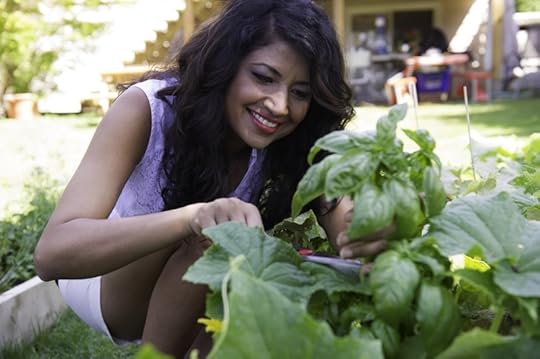
Bal cutting vegetables in her garden.
Photo courtesy of Cooking Channel.
January 4, 2014
Chef Elizabeth Falkner talks food, competition, and moving to New York
I’ve interviewed a variety of inspiring artists over the years, and among them some truly remarkable chefs. Now, as longtime readers of this blog know, I have a big old soft spot for chefs. They are some of the most fascinating artists out there, and the fact that they put their personalities, their history, their very souls right there on the plate is something I find truly beautiful. There are great chefs, there are amazing chefs, there are phenomenal chefs, and then there are chefs who are all of the above and also you just want to hang out with them over drinks because they’re so cool.
My guest today is one of those.
Elizabeth Falkner is the executive chef at Corvo Bianco in New York City. She moved here a year and a half ago from San Francisco, where she spent 23 years as a chef, and where she first made her mark in the culinary world as an award-winning pastry chef.
If you’ve never dined out in New York or San Francisco, don’t worry – you probably still know Chef Falkner. She’s the spiky-haired blonde with the perfect smile who can often be seen kicking butt on numerous culinary competitions including Food Network’s “Next Iron Chef, Redemption,” “Iron Chef America” and “Next Iron Chef, Super Chefs,” in which she was a finalist and runner up. She has been a three time competitor on “Food Network’s Challenge,” as well as a contestant on Bravo’s “Top Chef Masters.” In addition to competing, Falkner also has acted as judge on several network shows including Bravo’s “Top Chef Just Desserts,” “Top Chef Masters” and “Top Chef.”
Chef Falkner has been participating in the Winter Wonderlamb series of events in New York City, which included an appearance at the NYC Wine & Food Festival, a competition focusing on Australian lamb dishes, a special chef dinner, and an upcoming cooking class. It was through these events that the opportunity to interview her presented itself, so naturally I jumped at it. (And you thought I only went all fangirl over Daniel Radcliffe.) We did the interview via email and not over drinks, though maybe someday when we’re BFFs we’ll do that too. Baby steps.
Me: You haven’t always been a chef. In fact, you came to it a little later than some. How did you get from a fine arts degree to the amazing chef credentials you have now?
Chef Falkner: I have been a chef for 23 years in California until just a year and a half ago when I moved to NY. I worked for some great chefs in my early days and grew up in the California Food revolution. It was hard not to become part of the revolution then! I still use my fine art degree and all my soccer team playing in my running of restaurants/kitchens.
Me: Tell us about your new restaurant.
Chef Falkner: The new restaurant, Corvo Bianco, is great. I found the project almost built out and they needed a chef. It is on Columbus and 81st on the upper west side of Manhattan. It really is new American-Italian. We make all of our pastas and grilled pizzas and lots of seafood, oysters, steak and quail and Australian Lamb dishes! Also a great dessert menu.
Me: Let’s talk about Winter Wonderlamb. What do you like about working with lamb?
Chef Falkner: I truly love the flavor of Australian lamb and how it is raised and sent to the United States on ships rather than jetted and driven everywhere. The scale of what is sent around the world makes it a greener product with a better carbon footprint. I find that absolutely important today. Australian Lamb is such a delicious meat. Lamb used to be more gamey because of how it was raised. This lamb is not at all gamey and whether it is lamb chops, leg or shanks, it is just fantastic in all my lamb dishes. It is a good protein for us. Easy to digest and lean.
Me: You’ve popped up on a lot of competition shows lately – I was really pulling for you on “The Next Iron Chef, Redemption” and “Chopped All Stars.” What’s it like competing against other big-name chefs? Why do you do it?
Chef Falkner: I love the cooking competitions on television. I played amateur soccer for 28 years and the competitions are like a combination of cooking and a good soccer match to me. I think it is just amazing what different chefs will cook within a theme or with the same ingredients. I love to see the differences.
Me: You’ve also been on the other side of the judges’ table. What’s it like judging your peers on these shows?
Chef Falkner: Judging is like this as well, because you see how some people are great under pressure and some struggle, but they are taking the time and risk to play the game and hopefully do better than even they thought they could. I love it when you can see someone’s personality come out in their presentation and execution of their dish.
Me: Women are really coming into their own in the cooking world, considering that except for Julia Child, it was mostly a man’s world for so long. Not to get into a big gender thing, but are there still challenges to being a woman in this field?
Chef Falkner: Women have already come into their own in cooking. In fact, the men started cooking after women already had been cooking. Women don’t always cook for the same reasons as men. There are a tremendous amount of outstanding female chefs around the world and it’s up to the media to pay more attention to that fact and the influence we have.
Me: You’ve cooked on both coasts. How is San Francisco’s food world different from New York’s? I love both so I’m really curious to hear your take on it.
Chef Falkner: Both cities have big city mentality and are competitive within. It used to be more competitive between the two cities but I don’t think cooks today are the same. Chefs do projects all over the world and celebrate that. The big difference is the agriculture. California has gone through 30 plus years massively influenced by Alice Waters, Judy Rodgers, Joyce Goldstein, Barbara Tropp, Nancy Silverton, Mary Sue Milliken, Susan Feniger, Suzanne Goin and Annie Sommerville (just to name a few super female chefs) Jeramiah Tower, Wolfgang Puck and Paul Bertolli, and many others. These people changed what farmers were growing and now this is why there are heirloom fruits and vegetables and so many greens, artisanal products, etc. and this has changed the country and the world. The produce in the west coast is phenomenal. New York has great farms as well and a great public that is hungry for all kinds of food. It has the Atlantic Ocean, so different seafood. It has true seasons. I like the differences. I like cooking in the more dramatic seasons. It changes what you want to cook.
Me: Tell us about Elizabeth – the person you are when Chef Falkner takes off her apron. What do you do in your down time? Do you cook dinner every night or just go, in typical New Yorker style, “No way I’m cooking, let’s get takeout?”
Chef Falkner: I love to cook at home and don’t go out all the time. When I get home from work, I often cook for myself. My second cookbook, “Cooking Off The Clock” (2011, Ten Speed Press), is all about what I cook when I am at home. Sometimes I do hang out with my chef friends after work at one of their restaurants or out somewhere. In the mornings, I walk my dachshund, Hendrix, and then I run 3-5 miles, or do yoga or do a kick boxing or workout at my Equinox.
Me: This is the final question that all my guests get: What, or who, inspires you?
Chef Falkner: Other chefs and travel and cookbooks inspire me. I sometimes eat something that will make me want to cook something like it or take it somewhere else I’ve never been.
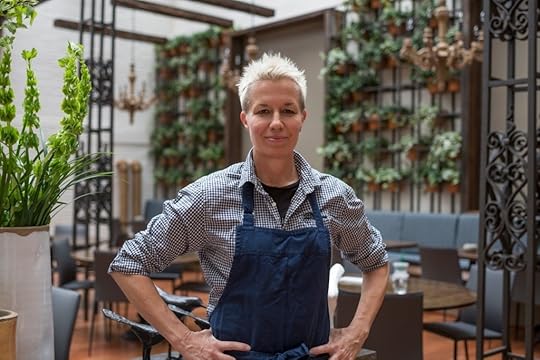
Chef Elizabeth Falkner
December 31, 2013
Happy New Year, friends! And buh-bye, 2013.
This year went by fast, didn’t it? Then again, lately they all do. As Gretchen Rubin says, the days are long but the years are short. I remarked to my friend Frank the other day that 2013 wasn’t a particularly great year and I’ll be glad to see it go. Frank, who is always candid whether I’m ready for it or not, responded with, “Yeah, but we say that about every year the older we get.”
Indeed.
While it’s true this year wasn’t the most stellar year I’ve had, it did have its high points, and even the low points had something to teach me. Last year at this time, I wrote a post about everything I learned during the previous year - the result of a conscious decision not to do a list of resolutions, for myself (too trite) or the world in general (too pretentious). It was so well-received that I’ve decided to do it again. So with that little fanfare, I give you…
Life Lessons from 2013
The less time I spend reading the comments under news articles or group Facebook posts, the better off I am.
It’s a waste of time to get mad at someone who acts like a jerk/nimrod/selfish brat. Better to make a mental note to myself that I never want to act like that. (An aside: It’s easy to spot these people. They are often the authors of comments under news articles or group Facebook posts.)
“The longer you love, the longer you live. The stronger you feel, the more you can give.” Peter Frampton
At the end of the day, we’re all in this together.
I’d rather kneel down and hand a homeless person money so I can look him or her in the eye, human to human, than write a check to a big charity.
Cancer sucks.
You can never be too kind.
The past is the past. Leave it there. Turn the page. Close the book.
Your dreams can always, no matter how old they are, still come true.
When in doubt, wear color.
“Apparently you can’t hack into a government supercomputer and then try to buy uranium without the Department of Homeland Security tattling to your mother.” Sheldon Cooper
Almost none of the things that I was upset about a year, a month, even a week ago, matter at all today.
Sometimes friendships don’t last. And that’s okay. The important ones do.
“You’re never too old to set another goal or dream a new dream.” C.S. Lewis
Don’t use tissues infused with lotion to wipe the mist off the bathroom mirror.
Art is the best medicine.
“Anger is like a piece of shredded wheat caught under your dentures. If you leave it there, you get a blister, and you have to eat Jell-O all week.” Sophia Petrillo
Happy New Year, my friends. Thank you for your support of this blog, my podcast, and my books during the past year. I look forward to 2014 with that kind of giddy anticipation that we get when we focus on everything that is still to be, everything that can be. I hope your new year is filled with belly laughs, great sandwiches, good friends, deep sleep, and smiles for no reason. I hope you dance to the radio, tell someone you love them out of the blue, make a Bucket List, turn your face toward the sun, read an obscure book, appreciate your body, take care of each other, and create something beautiful every day.
December 25, 2013
Merry Christmas, my friends
It’s early Christmas morning and I’m sitting in my old bedroom at my parents’ house, looking out over the snow that has fallen on Kansas over the past few days. Snow in Kansas isn’t unusual. It’s a fact of winter life Kansans are used to, whether it comes in big, fat, wet flakes that every kid knows makes the best snowballs, or the dry, powdery, disappointing kind that results in neither good snowballs nor school closings.
As I look out the window this morning, it’s the same. It’s the same snow that I’ve looked at most every year since I was born, and the same snow I was cursing for making visibility almost nil during the drive in on Saturday night. It’s a white blanket, frozen rain, putting the trees and plants to sleep and sending squirrels and birds on a frenzied hunt for food. It’s the same.
Then I remember hearing as a child that every flake is different. I had trouble wrapping my head around that – with so many flakes in one snowfall, it seemed impossible to me that there wasn’t some duplication somewhere. But everything I heard and read assured me it was true: every flake is unique. I watch the rising sun slowing turning up the lights on the frozen drifts, and I realize it isn’t the same. The snow is not the same. The flakes are different from each other, and different from every flake I’ve watched and played in since I was a little girl. The morning is not the same. The day is not the same. Christmas is not the same.
I think Christians too often take Christmas for granted. Even if we manage to look beyond the buy-oriented messaging the capitalist machine starts tapping into our brains even before Thanksgiving, even if we keep our focus on the religious aspect of the reason we celebrate, we still know what’s coming: Advent, the tree, the candles, the tabletop manger scene, the gifts, the stockings, the food, the Christmas story out of Luke that most of us probably know by heart. We participate in all of it. We enjoy it. It’s a part of our faith, our heritage, our community.
But I, for one, have been guilty of thinking of Christmas as always being the same. I know it so well. The routines, the smells, the colors, the lights, the songs… there is a comfort in their familiarity and I would never try to shake that up, for myself or anyone else. But if we look a little beyond the familiar, Christmas is never the same, is it?
This is my immediate family’s first Christmas without Dad. Mom hung his stocking up with everyone else’s, we talk about him, laugh over some memories, but his absence is palpable.Christmas isn’t the same for us. A few miles away, my extended family is grieving as my oldest cousin’s 23-year-old son son is slowly succumbing to cancer. All around me, friends and family are struggling with illness, job loss, divorce. Christmas isn’t the same for them.
All around us, things shift and change all year long. Birth and death, happiness and tears follow us with every new page on the calendar, so how can we ever think of Christmas as being the same old thing? Like the millions of different flakes that make the snow outside my window look the same as it always has, all we’ve been through this year, every spiritual step we’ve taken, every blessing, every stumble, has brought us to this Christmas. Spiritual people are always looking for the light in the darkness, the hope in the storm. If we let Christmas be that for us, it will never be the same old thing.
December 19, 2013
Guest post and book giveaway today only!
The amazing ladies over the Reading Between the Wines Book Club are hosting a guest post from me today. Pop over for a visit as we talk about finding your writing voice and how my transition from journalist to author impacted my writing style. They are also giving away one copy of each of my books! Below is an excerpt of the guest post. (To read the rest and enter the giveaway, click their name above, or visit www.readingbetweenthewinesbookclub.com.)
“For someone who has spent nearly all of her life calling herself a writer and 25 years getting paid to put words on paper, it seems a little late in the game to say I am finally beginning to understand the craft of writing.
Yet that’s exactly what’s happened to me in the two years since I shifted my writing career from full-time journalist to author. I don’t mean, of course, that I wasn’t a good writer before. I won awards for my news coverage and weekly column. I loved my job and I got such a rush from seeing people reading something I’d written in the evening paper.
But as a journalist, words weren’t writing as much as they were column inches, a byline, a paycheck. For a reporter, words are also a minefield. My opinion, any hint of bias, even the slightest slant could land me in court. Flowery, overly descriptive writing would earn the scorn of my fellow reporters, if it even made it past my editor. And forget about time to get creative if I wanted to – deadlines were always looming.
With that background, I think you’ll have a pretty good understanding of why, on my first day as a full-time author, I just sat and stared at the blank screen. I could write anything I wanted, I could sprawl my rosy prose across pages and hours and days if I wanted to. I could create characters and dialogue, I could tell my readers exactly what I thought. The shackles were off! Creative freedom was mine!
I was terrified…”
December 18, 2013
Meet Chef Jason Wrobel, host of the new cooking show ‘How to Live to 100′
If you, like me, have decided that this year is the year you finally get healthy for real, you’ll want to turn on Cooking Channel’s new show, “How to Live to 100” when it premiers just after the New Year.
I was excited when I heard about the new show, hosted by vegan chef Jason Wrobel, because I’ve long wanted a show for those of us who at least try to embrace a plant-based lifestyle. It’s a little intimidating to switch to vegetarianism, and going vegan is even more overwhelming. I told Jason as much when we were talking about his new show this week.
“I’ve been vegan for 15 years now, and the first seven and a half of those were spent in Detroit,” he said. “And I can honestly tell you that if you can be a healthy vegan in Detroit, you can do it anywhere.”
His whole family has a long track record of “healthy veganism,” a phrase I find interesting enough to ask him about. He explains that there are some key differences between eating healthy and just not eating meat or animal products. When he first started, he says, he was a junk food vegan. So just because it’s not meat, doesn’t automatically make it healthy. Got it. (*crosses Fritos off grocery list*)
To make converting to a plant-based diet a little less intimidating, Chef Wrobel suggests starting with an open mind.
“There are three important components,” he said. “The first is to research nutritional information. Ask yourself what you can substitute that will cover all the bases. Protein, iron, potassium… all of those important nutrients you can find in plant-based sources as well. There are no nutritional gaps. The second thing is to learn how to cook. You can find vegan restaurants all over the place, but it’s important you get comfortable in the kitchen. The third is to just experiment. Be willing to try certain foods, see how you feel.”
Once an aspiring actor, Jason turned to his next-greatest love, cooking, and earned his degree at the Living Light Culinary Arts Institute in California. He has worked as the Head Raw Food Chef at the award-winning Cafe La Vie in Santa Cruz, and now hosts “The J-Wro Show” on YouTube which showcases healthy recipes and lifestyle transformation tips. His first DVD, Simple Vegan Classics, is a best seller and has taught thousands of people how to prepare easy and nutritious plant-based dishes.
“How to Live to 100” is a continuation of all that he’s been doing for the past eight years. It’s not only an informative show for anyone who is interested in eating healthy and embracing a plant-based lifestyle, it also a lot of fun. Jason’s love of acting shows, too, with its sitcom feel and colorful characters. There’s Roshi Joe, Jason’s spiritual food guru, and Sunny, who owns a café and is the object of Jason’s unrequited affections. Together, they explore the world of healthy cooking, eating, and living, and help viewers find that elusive fountain of youth.
“We kind of have this playful competition, we’re always trying to outdo each other,” he explained. “I find inspiration in my friends. It’s a really fun, non-traditional format. There are some segments of me working in the kitchen and others where I visit some really great chefs in their restaurants. Most people talk about food from a taste perspective, but I realized what we really needed was an education on the role of food in longevity. So we decided to present it in a fun and lighthearted way, and show people how easy it can be to do it in their own home. Most of the stuff we talk about you can find at your local grocery store or farmers’ market.”
Speaking of the fountain of youth, I was beyond curious to hear what Jason has to say about “superfoods,” which are constantly cropping up in my own culinary readings.
“Superfoods are nutritionally dense, highly mineralized foods, sometimes from pristine growing environments or sometimes from cultures that have grown them for centuries,” he said. “Some of my favorites are coconuts, blueberries, and dark chocolate. They all have specific benefits to the human body, such as scavenging for free radicals. Some other superfoods have been less common but are coming more into the mainstream now, things like Goji berries, hemp berries, and chia seeds. Chia seeds were probably the most popular food of this year.”
The whole concept of “How to Live to 100” is another stroke of Cooking Channel ingenuity, from casting the boyish and charming Chef Wrobel to its strategic premiere at a time when most people’s thoughts are on how to keep those New Year’s resolutions. And, as Jason points out, more and more pop culture figures are choosing a plant-based lifestyle.
“I really feel like the timing of this show is absolutely perfect, and the demand for this type of cuisine is at an all-time high,” he said.
“How to Live to 100” premieres Friday, Jan. 3 at 9 p.m. on Cooking Channel.
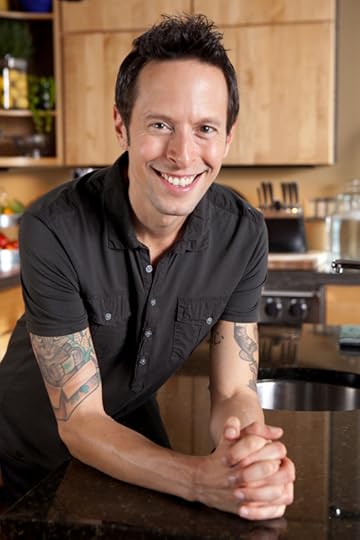
Chef Jason Wrobel
(Photo courtesy of Cooking Channel)
December 13, 2013
Are there potholes in the fast lane to fame?
I was having a conversation with my 17-year-old niece, Alex, a few days ago. Now … before I continue with this story, please bear in mind that Alex finds me slightly cooler than her mother – only because I am not her mother – but not nearly as cool as a half-off sale on OPI nail polish. She sometimes gives the illusion of listening to what I say, but I’m aware there’s a filter in her brain that takes it in, pokes it, squeezes it, smells it, then usually hands it back to me and goes “Meh.”
Now back to our conversation… we were talking about the various celebrity interviews I’ve done over the years, and I was explaining to her that my interview with Graham Russell of Air Supply a few weeks ago was as big a deal for me as it would be for her to get to interview One Direction. This little tidbit made it through the filter and was accepted. But then I said, “So you see, Alex, maybe you’ll want to become a writer and then you can meet your heroes.”
The filter rejected that.
“Or I could just become famous and meet them that way,” she said.
Okay, first of all, ouch. I’m not looking forward to telling my fellow writers that we’re not now, nor will we ever be, famous. Second of all, is this what kids think now? That you just need to decide you’re going to “become famous” and fame overhears you and it happens? I’m going to guess that answer is a resounding yes, given that it appears being a “YouTuber” is actually a career goal.
I just… I just can’t.
I wrote a guest post this week on fellow author Jon McDonald’s blog about the perils of being what I am right now: an old writer in a new world. The hyperlink on his name will take you there, but let me just reiterate one thing I said: in our instant-gratification society, we’ve lost sight of quality. I specifically talk about people who call themselves writers and slap dozens of sloppily written books on Amazon every year, but it’s true for anyone really. If your greatest goal is fame, fast, what you do is not art. It’s a commodity. And it’s cheap.
I submitted an article to The New Yorker’s “Shouts and Murmurs” column a couple of months ago for consideration. This week I got a note back, and although they turned me down for publication, it was a personal note, with specifics about my piece that were very complimentary and encouraged me to submit again. In today’s world of flash-in-the-pan success stories, this would label me a dismal failure. To me, it’s a huge boost. There was a time when my submission to such a publication wouldn’t have gotten a second glance. This did. This is creative growth. And when I submit my next piece to them, who knows?
I don’t think that fame, in and of itself, should be anyone’s goal. Someone who answers “What would you like to become someday?” with “famous” deserves a smack. At least know what you want to be famous for and be willing to work for it. It makes me want to boil my brain in bleach that I even know what a Kardashian is. Please don’t give me any more like them.
I find it incredibly sad that Alex, and so many out there like her, see fame as the answer, the goal, the finish line. What are they learning along the way? For awhile, I considered social media a blessing, a great way to publicize my work for little or no cost, and while I still think it can serve that purpose, I’m horrified, frankly, to realize how many youngsters see it as their express ticket to fame. I weep for our world’s cultural and intellectual future if it is.




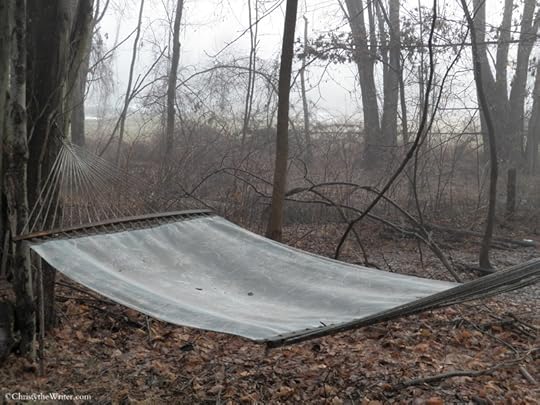

![foggy front[3]](https://i.gr-assets.com/images/S/compressed.photo.goodreads.com/hostedimages/1389932148i/8102848._SX540_.jpg)

